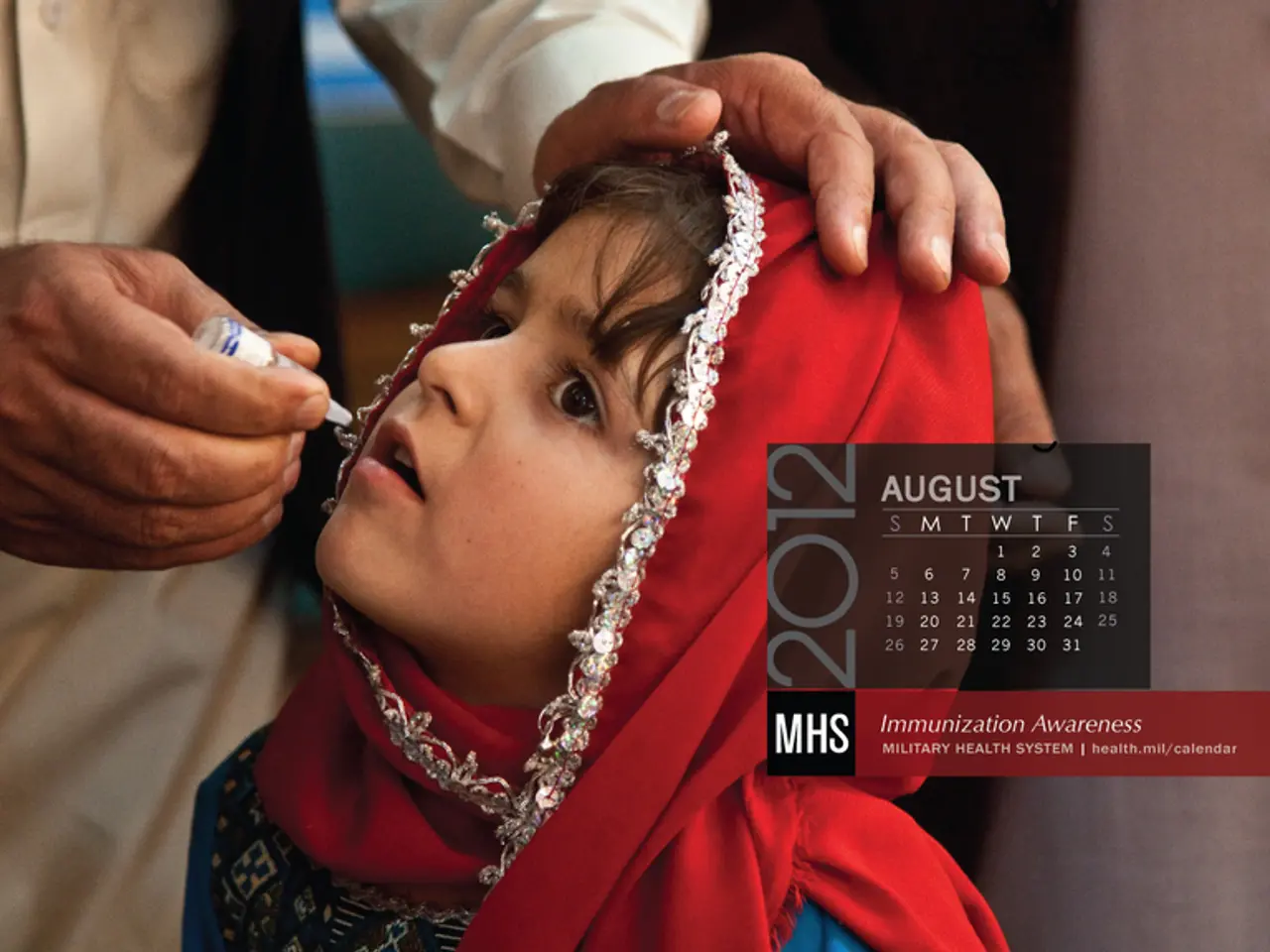Infant's Initial Twelve Months: Immunization Guidelines in Nigeria
In Nigeria, a comprehensive vaccination schedule is in place to safeguard infants against multiple childhood diseases. This schedule follows a specific timeline and includes vaccines such as DTP (diphtheria, tetanus, pertussis), malaria, measles, rotavirus, and more, in line with World Health Organization (WHO) recommendations [1][2][3].
The journey begins at six weeks, where the baby receives the first round of vaccines. This includes the pentavalent vaccine, which offers protection against diphtheria, tetanus, pertussis (whooping cough), hepatitis B, and Haemophilus influenzae type b [4].
By six months, the initial 3-dose DTP series is completed, with a minimum gap of four weeks between each dose [5]. Between five to seven months, malaria vaccine doses are administered [6]. A booster dose of the malaria vaccine is given at 15 months, or up to 23 months if delayed [7].
At 12 to 23 months, a booster dose of the DTP-containing vaccine is recommended, and additional DTP boosters are given at 4–7 years and 9–15 years [2].
The vaccination schedule continues with the rotavirus vaccine, given at 6 weeks and 14 weeks to protect against rotavirus infection, a common cause of severe diarrhea and dehydration in babies [8]. At ten weeks, the baby also receives the pneumococcal conjugate vaccine (PCV) and oral polio vaccine (OPV) [9].
The BCG vaccine, given to newborns, protects against tuberculosis [10]. Vaccination against measles is crucial to prevent outbreaks and protect infants from this dangerous disease [11]. At nine months, the measles vaccine is administered to provide immunity against measles, a highly contagious viral disease that can cause severe complications, including pneumonia, blindness, and even death [12].
Following the recommended vaccination schedule ensures that babies receive necessary protection at the right time. Parents are encouraged to ask healthcare providers to explain the potential side effects of each vaccine [13]. It is also crucial to inform healthcare providers about any allergies or previous adverse reactions the baby may have had to vaccines [14].
For added support, parents may consider bringing someone for moral and practical assistance during the vaccination process [15]. The Nigerian immunization schedule is designed to protect infants against multiple diseases early in life, with booster doses to maintain immunity as children grow [2].
For a detailed schedule beyond DTP and malaria vaccines, refer to Nigeria’s National Immunization Schedule issued by the National Primary Health Care Development Agency (NPHCDA) or UNICEF Nigeria [16]. The coordination of these immunization programs is supported by the WHO, UNICEF, and Gavi [1][2][3].
References: [1] UNICEF. (2021). Nigeria Country Profile. Retrieved from https://data.unicef.org/country/nga/ [2] WHO. (2021). Vaccines and Immunization. Retrieved from https://www.who.int/countries/nga/immunization/en/ [3] Gavi. (2021). Nigeria. Retrieved from https://www.gavi.org/countries/nigeria [4] CDC. (2021). Pentavalent Vaccine. Retrieved from https://www.cdc.gov/vaccines/pubs/pinkbook/downloads/hep-b/hepb-chapter.pdf [5] WHO. (2021). Diphtheria-Tetanus-Pertussis (DTP) vaccine. Retrieved from https://www.who.int/immunization/diseases/diphtheria/en/ [6] WHO. (2021). Malaria Vaccines. Retrieved from https://www.who.int/immunization/diseases/malaria/en/ [7] WHO. (2021). Malaria Vaccines. Retrieved from https://www.who.int/immunization/diseases/malaria/en/ [8] CDC. (2021). Rotavirus Vaccine. Retrieved from https://www.cdc.gov/vaccines/vpd/rotavirus/public/index.html [9] CDC. (2021). Pneumococcal Conjugate Vaccine. Retrieved from https://www.cdc.gov/vaccines/pubs/pinkbook/downloads/pcv/pcv-chapter.pdf [10] CDC. (2021). BCG Vaccine. Retrieved from https://www.cdc.gov/vaccines/pubs/pinkbook/downloads/bacillus-calmette-guerin/bacillus-calmette-guerin-chapter.pdf [11] CDC. (2021). Measles Vaccine. Retrieved from https://www.cdc.gov/vaccines/vpd/measles/public/index.html [12] CDC. (2021). Measles Vaccine. Retrieved from https://www.cdc.gov/vaccines/vpd/measles/public/index.html [13] CDC. (2021). Vaccine Safety. Retrieved from https://www.cdc.gov/vaccinesafety/concerns/index.html [14] CDC. (2021). Vaccine Safety. Retrieved from https://www.cdc.gov/vaccinesafety/concerns/index.html [15] CDC. (2021). Support During Vaccination. Retrieved from https://www.cdc.gov/vaccines/vpd/vaccines-work/support-during-vaccination.html [16] NPHCDA. (2021). Nigeria National Immunization Schedule. Retrieved from https://nphcdagov.ng/nigeria-national-immunization-schedule/ [17] UNICEF Nigeria. (2021). Immunization. Retrieved from https://www.unicef.org/nigeria/immunization
- Parents in Nigeria are advised to consult with healthcare providers about the potential side effects of vaccines given to their babies, ensuring they are fully informed.
- Kids aged 9 months receive the measles vaccine, a crucial step in preventing dangerous outbreaks and severe complications.
- The family's mental health is essential during the vaccination process, so parents may consider bringing someone for support.
- The vaccination schedule in Nigeria not only includes DTP and malaria vaccines, but also protects against other diseases like rotavirus, pneumococcal, and tuberculosis.
- For further details on the immunization schedule, parents can refer to the National Primary Health Care Development Agency's schedule or UNICEF Nigeria's resources.
- It is important for parents to notify healthcare providers about any allergies or previous adverse reactions their baby may have had to vaccines, ensuring the most effective and safe health-and-wellness care for their children.




